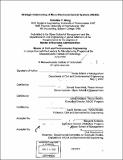Strategic outsourcing of micro-electromechanical systems (MEMS)
Author(s)
Wong, Christine Y., 1975-
DownloadFull printable version (4.818Mb)
Alternative title
Strategic outsourcing of MEMS
Other Contributors
Leaders for Manufacturing Program.
Advisor
Donald Rosenfield and James Masters.
Terms of use
Metadata
Show full item recordAbstract
ABB Automation is starting to experiment with Micro-electrical Mechanical Systems (MEMS) as an enabling technology for their products. If ABB's implementation of MEMS is found successful, it will be able to create breakthrough products and services that will revolutionize the market in ABB's industrial sensors, instrumentation and analytical areas. The thesis begins with a description of ABB as a company and then provides a brief overview on MEMS and the challenges ABB faces as it tries to commercialize MEMS enabled products. A literature review is also included to explain how companies can better profit from technological innovations such as MEMS. An analysis of ABB's decision to outsource MEMS is described with multiple frameworks including a vertical integration versus outsourcing model as well as a traditional make or buy decision assessment from a financial perspective. The decision to outsource is valid given the stage of the technological life cycle and the company's resolution to use MEMS in selected products. Since the strategic fit argument is still questionable through much of ABB, outsourcing is a legitimate choice for MEMS. Outsourcing allows a greater amount of flexibility and the least amount of capital investment. Although ABB has decided to outsource its MEMS capabilities, it has to realize that there is a possibility of vertical market failure with MEMS. There are very few suppliers in the market today with potentially fewer in the future as mergers and acquisitions begin to take place once a dominant design is established. This vertical market failure encourages vertical integration and not outsourcing.
Description
Thesis (M.B.A.)--Massachusetts Institute of Technology, Sloan School of Management; and, (S.M.)--Massachusetts Institute of Technology, Dept. of Civil and Environmental Engineering; in conjunction with the Leaders for Manufacturing Program at MIT, 2002. "June 2002." Includes bibliographical references (leaves 60-61).
Date issued
2002Department
Leaders for Manufacturing Program at MIT; Massachusetts Institute of Technology. Department of Civil and Environmental Engineering; Sloan School of ManagementPublisher
Massachusetts Institute of Technology
Keywords
Sloan School of Management., Civil and Environmental Engineering., Leaders for Manufacturing Program.